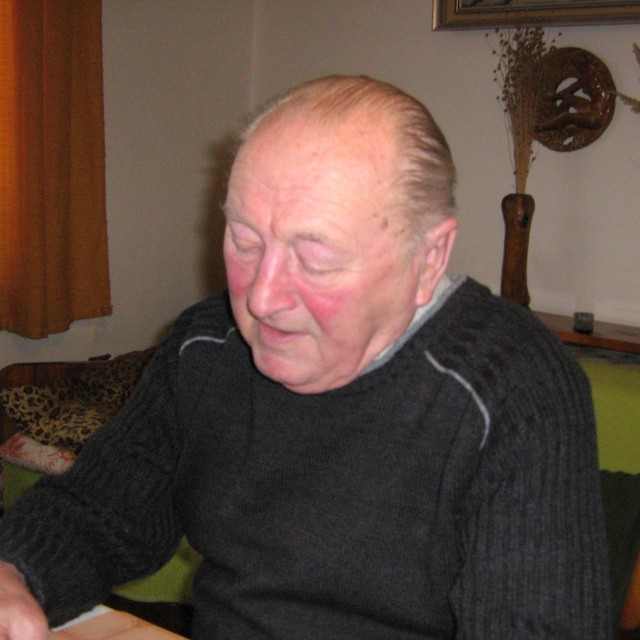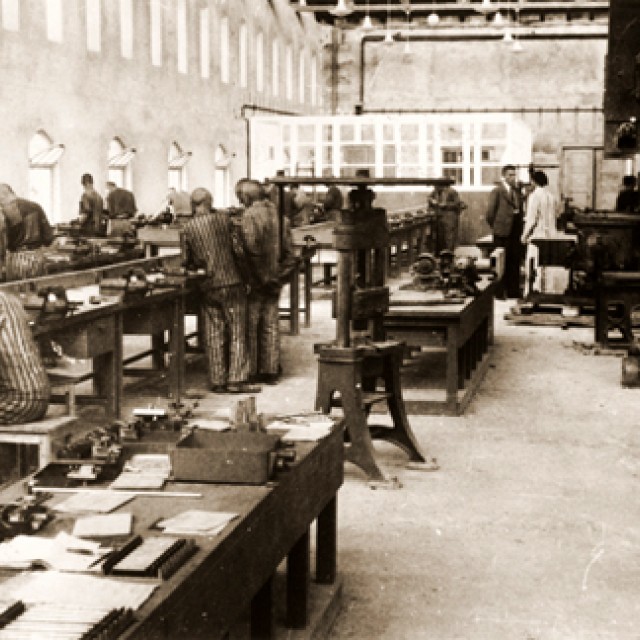The Polish capos were the worst
František Cenkl joined in June 1943 one of labour camps in Auschwitz III. (Buchenwald – Ost., block 6). As a labourer of the Prague-based company Sedlák he worked on the factory of I. G. Farben, the producer of synthetic petrol. The forced labour turned into imprisonment immediately after arrival. Any approach to the camp fence was met with deadly machine gun fire.
The labourers worked twelve-hour shifts under constant beating and bullying with minimum food. František Cenkl recalls that the Polish capos were the worst as they did everything to win favours with their Nazi jailers. Prisoners were often beaten to death for the smallest shortcoming. Due to terrible hygiene diseases and epidemics spread. The neighbouring camp with French and American prisoners was seized by the epidemics of typhus fever and meeting death was thus an everyday experience. In order to contain the epidemics, the prisoners surrounded the camp with a ditch, into which lime was brought constantly to prevent rats from crossing from one camp to another and to spread diseases.
In the early 1944 František Cenkl and his friend Karel of Lazníky near Přerov took the decision to escape. They hid in a wagon of a train that delivered material for production into the factory. The soldiers checking the trains did not see them, so they managed to get near the Protectorate border near Bohumín. There they mingled with some labourers and got near the border in Michálkovice (today a part of Ostrava). They were aware all the time that in case of capture they faced capital punishment. When the guards did not pay attention, they ran through the railway station building and boarded the train heading for Přerov and then to Olomouc.
Hodnocení
Abyste mohli hodnotit musíte se přihlásit!
Trasy
Příběh není součastí žádné trasy.
Komentáře

František Cenkl
Born on September 13, 1923, in Charváty near Olomouc. During his life he served a sentence both in Nazi and Communist prisons. At the time of WWII he was studying the Business School in Olomouc and there one of his friends was the German Walter Knapp, a member of the partisan group in Velká Bystřice. The group focused mainly on damaging transports with military material around Olomouc. Their activities, however, led to higher vigilance of German security which increasingly raided the area. There was a shadow of suspicion surrounding František Cenkl too. In June 1943 he was sent by the Gestapo to “forced labour” in Auschwitz. On arrival in the camp, however, he was turned into a prisoner. Under dreadful conditions he worked on the construction of I. G. Farben for synthetic petrol. In early 1944 he and his friends decided to flee the camp. They hid in a train that went to the factory and under dramatic circumstances got to Olomouc. In order to avoid suspicion he counterfeited his labour book and joined Wagner-Werke company. Thanks to this he survived to see the liberation of Olomouc by the Soviet Army. After the war he first went to military service and then joined a wholesale company, where he was the chairman of the trade union organisation. As a National Socialist he disapproved of the Communist regime. He refused to join the Communist Party and at the company meeting he had a speech in which he emphasised that the trade unions must be in opposition to the ruling party, otherwise they lose their meaning. Shortly after the speech he was imprisoned and sentenced for one and a half year to mines in Jáchymov. He was taken to prison at the time his wife was expecting a child. During the whole time of his imprisonment he didn’t even learn whether the child was born healthy. In September 1951 he was pardoned in Karlovy Vary. He never received any apology, let alone compensation. After his return home he joined the Moravia-Silesian Steel Works. He worked his way up to become a manager and stayed on the job well until his retirement. He currently lives in Olomouc.



